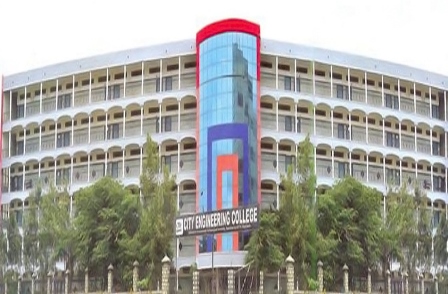About Us
Welcome To City Engineering College
City Engineering College, Bangalore affiliated to Visvesvaraya Technological University (VTU) is centrally located in Bangalore. The College has expanded over the last 19 years with sophisticated infrastructure as a part of the Institution’s commitment to provide higher quality education in the area of Engineering. The highly facilitated landmark building – provides a perfect ambience for creativity and learning. City Engineering College is known for its academic excellence, friendly welcoming atmosphere and community spirit. Over large number of full time students study here in a wide range of programs. It is a centre of talented, experienced teachers who inspire and energize the students to achieve the best.
The Institutions believe in providing a high quality education to the prospective professionals of the country for which necessary quality bench marks have been put in place, in the areas of faculty recruitment, training and development, teaching and learning process, student’s grooming, external academic audits and feedback system for academic enhancement.
Our MissionM1 To Encourage Knowledge Acquisition and Foster Research and Innovation. M2 To Prepare Students for Immediate Employment, which leads to Technological and Socio-Economical Growth. M3 To Provide Lifelong Learning for a Long Productive Career
Our VisionMaking Remarkable Contribution by Disseminating Knowledge and Imparting Training on Emerging Trends in Engineering and Technology through various Programmes to Excel both at National and International level
Our ValuesWe believe firmly in politeness, responsibility, respect, courtesy and good manners.
ABOUT US
VISIONMaking Remarkable Contribution by Disseminating Knowledge on Emerging Trends in Engineering and Technology through various Programmes, Innovation and Research so as to Excel in Quality both at National and International level and to provide Career Guidance & Training for Employment.
MISSION
M1. To encourage Knowledge Acquisition and Foster Innovation & Research.
M2. To Prepare Students for Immediate Employment, leading to Technological and
Socio-
economical growth.
M3. To Provide Guidance for a Productive Career under various programmes.
PO1 – Engineering knowledge: Apply the knowledge of mathematics, science,
engineering
fundamentals, and an engineering specialization to the solution of complex
engineering problems.
PO2 – Problem analysis: Identify, formulate, review research literature, and
analyze complex
engineering problems reaching substantiated conclusions using first principles
of mathematics,
natural sciences, and engineering sciences.
PO3 – Design/development of solutions: Design solutions for complex engineering
problems and
design system components or processes that meet the specified needs with
appropriate
consideration for the public health and safety, and the cultural, societal, and
environmental
considerations.
PO4 – Conduct investigations of complex problems: Use research-based knowledge
and research
methods including design of experiments, analysis and interpretation of data,
and synthesis of the
information to provide valid conclusions.
PO5 – Modern tool usage: Create, select, and apply appropriate techniques,
resources, and modern
engineering and IT tools including prediction and modeling to complex
engineering activities with an
understanding of the limitations.
PO6 – The engineer and society: Apply reasoning informed by the contextual
knowledge to assess
societal, health, safety, legal and cultural issues and the consequent
responsibilities relevant to the
professional engineering practice.
PO7 – Environment and sustainability: Understand the impact of the professional
engineering
solutions in societal and environmental contexts, and demonstrate the knowledge
of, and need for
sustainable development.
PO8 – Ethics: Apply ethical principles and commit to professional ethics and
responsibilities and
norms of the engineering practice.
PO9 – Individual and team work: Function effectively as an individual, and as a
member or leader in
diverse teams, and in multidisciplinary settings.
PO10 – Communication: Communicate effectively on complex engineering activities
with the
engineering community and with society at large, such as, being able to
comprehend and write
effective reports and design documentation, make effective presentations, and
give and receive
clear instructions.
PO11 – Project management and finance: Demonstrate knowledge and understanding
of the
engineering and management principles and apply these to one’s own work, as a
member and
leader in a team, to manage projects and in multidisciplinary environments.
PO12 – Life-long learning: Recognize the need for, and have the preparation and
ability to engage in
independent and life-long learning in the broadest context of technological
change.
Computer Science & Engineering: Graduates are able to Analyze, Design and Construct Civil Engineering systems with state-of-the art Technologies.
Quality PolicyThe Institution believes in providing High Quality Education to the Students using necessary quality benchmarks in the area of Faculty Recruitment, Development and Student Learning processes through sustained efforts.

